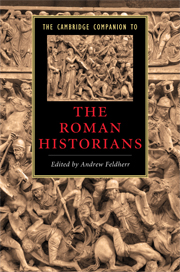Book contents
- Frontmatter
- Introduction
- Part I Approaches
- Part II Contexts and Traditions
- Part III Subjects
- Part IV Modes
- Part V Characters
- Part IV Transformations
- 20 Josephus
- 21 The Roman exempla tradition in imperial Greek historiography: The case of Camillus
- 22 Ammianus Marcellinus: Tacitus’ heir and Gibbon’s guide
- 23 Ancient Roman historians and early modern political theory
- 24 Re-writing history for the early modern stage: Racine’s Roman tragedies
- 25 The Roman historians and twentieth-century approaches to Roman history
- Chronological list of the historians of Rome
- Bibliography
- Index
24 - Re-writing history for the early modern stage: Racine’s Roman tragedies
from Part IV - Transformations
Published online by Cambridge University Press: 28 November 2010
- Frontmatter
- Introduction
- Part I Approaches
- Part II Contexts and Traditions
- Part III Subjects
- Part IV Modes
- Part V Characters
- Part IV Transformations
- 20 Josephus
- 21 The Roman exempla tradition in imperial Greek historiography: The case of Camillus
- 22 Ammianus Marcellinus: Tacitus’ heir and Gibbon’s guide
- 23 Ancient Roman historians and early modern political theory
- 24 Re-writing history for the early modern stage: Racine’s Roman tragedies
- 25 The Roman historians and twentieth-century approaches to Roman history
- Chronological list of the historians of Rome
- Bibliography
- Index
Summary
Nowhere has the Nachleben of Roman historiography been more visible and productive than in early modern theater. From the Renaissance to Romanticism, legions of tragedies and operas took their subjects from ancient history and drew heavily, and often literally, on Latin and Greek sources, many of which were familiar to dramatists and audiences alike. This intertextual dependence was especially strong in theatrical cultures which - unlike those of Elizabethan England or Golden Age Spain - came to be governed by a neo-classical poetics of imitatio that virtually excluded not only purely fictional subjects (which were restricted to comedy) but also the staging of recent, national history: in this framework, the role of serious drama was to re-enact illustrious and distant events attested by a textual tradition, be it mythology or secular and sacred history. At the same time, Aristotle's famous distinction, in chapter 9 of his Poetics, between history, which recounts “the particular” (what actually happened), and poetry, which tends to express “the general” (what could happen), freed writers from the yoke of factual truth and authorized a creative handling of the historical matter.
- Type
- Chapter
- Information
- The Cambridge Companion to the Roman Historians , pp. 380 - 393Publisher: Cambridge University PressPrint publication year: 2009
- 1
- Cited by



